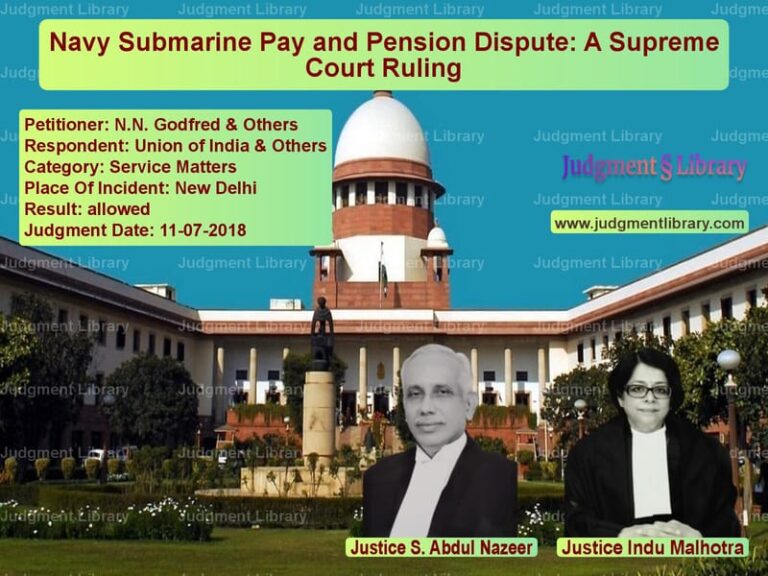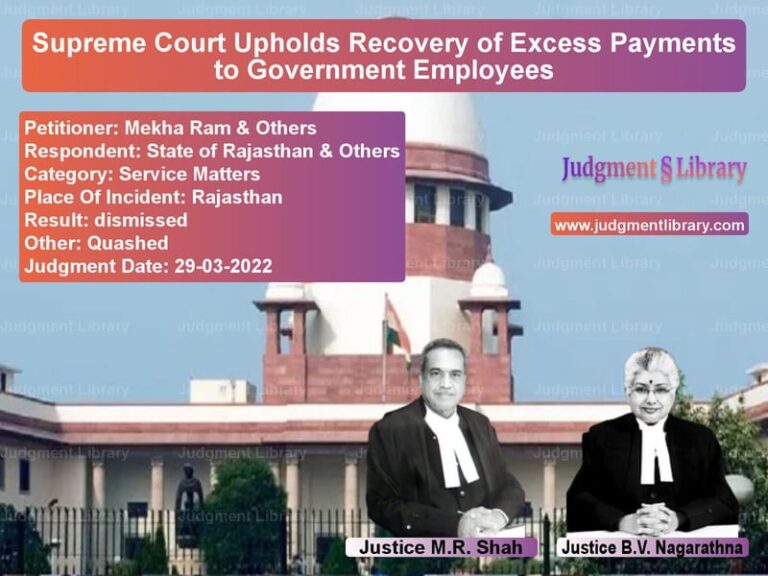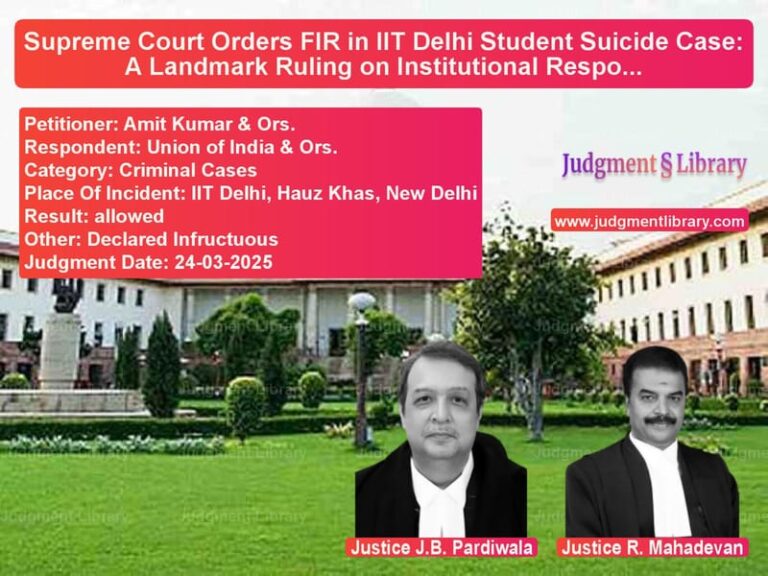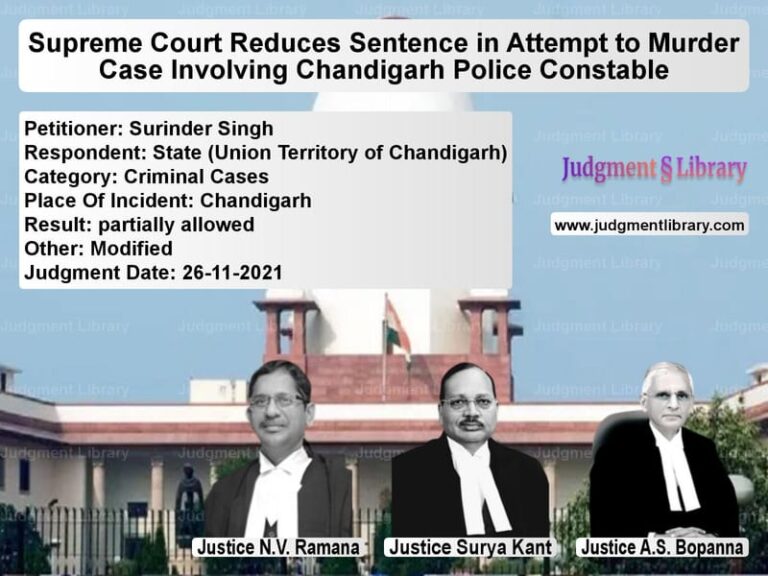Ownership Dispute Resolved: Supreme Court Upholds Validity of Sale Deeds in Property Case
The case of Manik Majumder & Ors. vs. Dipak Kumar Saha (Dead) through LRs & Ors. revolves around a long-standing property dispute. The Supreme Court, in its judgment dated January 13, 2023, overturned the High Court’s ruling and upheld the concurrent findings of the lower courts, dismissing the plaintiffs’ claim of ownership over the disputed land. This judgment clarifies key aspects of property law, especially regarding the validity of sale deeds executed through a Power of Attorney (PoA).
Background of the Case
The dispute began when the original plaintiffs filed a suit in 1985, claiming ownership of the land based on two sale deeds executed in 1968. The plaintiffs alleged that the original owner, Braja Mohan Dey, had granted a PoA to one of the plaintiffs, Dhirendra Chandra Saha, while residing in East Pakistan (now Bangladesh). Using this PoA, Dhirendra Chandra Saha allegedly sold the land to himself and later transferred it to his wife, Gita Rani Saha. The plaintiffs sought a declaration of title and recovery of possession.
Legal Issues Examined
- Was the Power of Attorney executed in compliance with Section 33(1)(c) of the Registration Act, 1908?
- Did the plaintiffs successfully establish their ownership based on the sale deeds?
- Was the High Court justified in setting aside the concurrent findings of the lower courts?
Arguments Presented by the Defendants
The defendants, represented by Manik Majumder & Ors., contended that:
- The plaintiffs failed to produce the original Power of Attorney, which was the foundation of their claim.
- The sale deed executed by Dhirendra Chandra Saha in his own favor was invalid since there was no proof that the PoA was legally authenticated.
- The defendants had been in possession of the land for over thirty years and had paid municipal taxes.
- The High Court erred in disregarding the factual findings of the trial and first appellate courts.
Arguments of the Plaintiffs
The plaintiffs, represented by the legal heirs of Dipak Kumar Saha, argued that:
- The sale deeds were registered, and registration carries a statutory presumption of validity.
- The endorsement on the sale deed by the Sub-Registrar was sufficient proof of the PoA’s existence.
- The defendants had no legal title to the land and had forcibly occupied it.
Supreme Court’s Observations
The Supreme Court, comprising Justice M.R. Shah and Justice C.T. Ravikumar, ruled that the plaintiffs failed to establish a valid claim over the property. The Court made the following key observations:
“The High Court has committed a grave error in drawing the statutory presumption in favor of the plaintiffs. The plaintiffs failed to produce the original Power of Attorney, which was the foundation of their claim.”
The Court further emphasized:
- The Power of Attorney was allegedly executed in East Pakistan (now Bangladesh), but the plaintiffs did not provide any evidence proving its authenticity.
- Under Section 33(1)(c) of the Registration Act, 1908, a Power of Attorney executed outside India must be authenticated by a Notary Public, Magistrate, or an Indian Consular Officer. No such authentication was provided in this case.
- The plaintiffs attempted to amend their claim during the appellate stage, alleging that the defendants had taken possession of the PoA, which was not mentioned in their original suit.
- The lower courts correctly held that the plaintiffs could not establish their title, as the missing PoA raised serious doubts about the validity of the sale deeds.
Final Judgment
The Supreme Court ruled that:
- The plaintiffs’ claim was invalid due to non-production of the Power of Attorney.
- The High Court erred in overturning the well-reasoned decisions of the lower courts.
- The original trial court judgment, which dismissed the suit, was reinstated.
Implications of the Judgment
This ruling has significant implications:
- Strengthening Title Verification: Establishes that ownership claims based on a Power of Attorney must comply with legal requirements.
- Precedent for Future Property Disputes: Prevents individuals from misusing sale deeds executed through unverified PoAs.
- Judicial Review of High Court Decisions: Reinforces the principle that High Courts should not overturn concurrent findings without strong justification.
Conclusion
The Supreme Court’s decision in Manik Majumder & Ors. vs. Dipak Kumar Saha (Dead) through LRs & Ors. reinforces the importance of adhering to legal formalities in property transactions. The ruling affirms that registered sale deeds alone are not enough to establish ownership—proper documentation, including a legally authenticated Power of Attorney, is crucial. This judgment serves as a strong precedent in property law, ensuring that fraudulent claims based on unverified documents do not succeed.
Petitioner Name: Manik Majumder & Ors..Respondent Name: Dipak Kumar Saha (Dead) through LRs & Ors..Judgment By: Justice M.R. Shah, Justice C.T. Ravikumar.Place Of Incident: Tripura, India.Judgment Date: 13-01-2023.
Don’t miss out on the full details! Download the complete judgment in PDF format below and gain valuable insights instantly!
Download Judgment: manik-majumder-&-ors-vs-dipak-kumar-saha-(de-supreme-court-of-india-judgment-dated-13-01-2023.pdf
Directly Download Judgment: Directly download this Judgment
See all petitions in Property Disputes
See all petitions in Contract Disputes
See all petitions in Landlord-Tenant Disputes
See all petitions in Judgment by Mukeshkumar Rasikbhai Shah
See all petitions in Judgment by C.T. Ravikumar
See all petitions in allowed
See all petitions in Quashed
See all petitions in supreme court of India judgments January 2023
See all petitions in 2023 judgments
See all posts in Civil Cases Category
See all allowed petitions in Civil Cases Category
See all Dismissed petitions in Civil Cases Category
See all partially allowed petitions in Civil Cases Category







